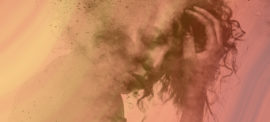
by Dr.Moira Borg MD Gestalt Psychotherapist
I believe that one of the most challenging situations for any human being is to be in the presence of another’s deep suffering. It brings up a hotch-potch of emotions and drives ranging from the need to make it better for the other to releif that the suffering is not ours to possible painful memories of similar expreriences that we might have passed through. Whatever drives our response to the suffering depends on our relationship with the sufferer and the way we have learnt to hold pain primarily our own.
Different people respond in various ways to others’ plight. Some simply flee the scene either out of fear of not being able to handle it or out of sheer lack of care and concern. Others attempt to disperse it with a few well tried out cliches that are thrown at the suffering individual whether he/she have just twisted his/her ankle on a pothole, suddenly lost a loved one or have been diagnosed with a terminal illness while yet others use it as an opportunity to air their own drama while totally missing out the sufferer in the process. A few are ready to reach out and hold the suffering person’s pain even at the cost of giving up their own needs.
Such presence, or lack of it thereof, is one of the main reasons while many are made to feel cut off and alone in their suffering or worse still made to beleive that their anguish is a burden or a show of hysterics, weakness or failure. The drive to individualism, and the aura of pride and self-achievment that shrouds it, compounds the collective disdain and dismissal to anyone reaching out leaving the suffering individual little option but to withdraw in his/her shell like a thwarted mollusc in the hope that the pain would somehow fizzle out or that someone would suddenly materialise and simply care to be there.
I believe that what drives so many people nowadays to seek therapy as a way of dealing with their suffering is the deep desire of finding that someone who can truly understand what they are going through and be with them whilst finding ways of living it through. This, in fact, is one of the main responsibilities of the therapist, to bracket off all his/her experiences of suffering and failures and focus on what the client brings both about him/herself and the world he/she lives in.
Being a therapist thus goes beyond the academic exercise of ‘just listening’ and ‘knowing what to do with suffering’ and likewise giving the right advice to the client. It is not just about years of hard work of studying and training about the human psyche and the world or society we have created. It is also about learning what suffering truly is by exploring our own and processing it bit by painful bit through the able support of our teachers and peers. It is the ‘going out there’ with what we have processed and experienced and looking at our world with ‘new’ eyes while at the same time keeping ourselves abreast with the latest literature, knowledge and experience in the field.
In my experience after being in the world for almost half a century, in the field of therapy for more than six years and that of a medicine for more than twenty, being with suffering is a unique way of exploring the true depths of human experience as I believe that nothing like pain, when one truly chooses to experience it, can bring out our truth, the essence of who we are and who we choose to become. As a result, when I am in the presence of suffering, I sit with respect and dignity to this raw truth that the person in front of me chooses to bring forward with so much courage knowing that in my presence there is the acknowledged experience of the pain and suffering that shaped me.
It is this shared lived experience of suffering, more than any words of encouragement and advice, that mostly supports the client to explore his/her own pain and anguish, that implicit ‘I know, because I have felt ’. Above all it is the embodied experience of survival through pain that gives the client renewed hope and strength coming especially from being seen and held in his/her suffering.
